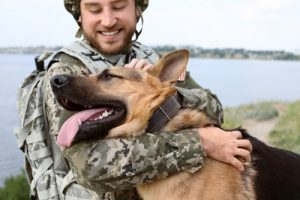
U.S. Sen. Thom Tillis (R-NC) last week sponsored bipartisan legislation that aims to reduce suicides among U.S. military veterans by partnering those who are experiencing symptoms of PTSD and other post-deployment issues with service dogs through a U.S. Department of Veterans Affairs (VA) pilot program.
“We must do everything possible to combat veteran suicide, including innovative treatments like service dog therapy that address post-deployment mental health conditions,” said Sen. Tillis. “Our veterans deserve every tool in the toolbox when it comes to their mental health, which is why I’m proud that this legislation encourages dog training therapy for veterans.”
Sen. Tillis and bill cosponsors including U.S. Sen. Kyrsten Sinema (D-AZ) introduced the Puppies Assisting Wounded Servicemembers (PAWS) for Veterans Therapy Act, S. 613, which would direct the VA Secretary to carry out a pilot program on dog training therapy and would amend U.S. Code to permit service dogs be provided to veterans with mental illnesses but who do not necessarily have mobility impairments, according to the text of the bill.
The number of veterans with mental health conditions, such as PTSD and substance use orders, increased from 27 percent in 2001 to more than 40 percent in 2014, according to an August 2016 VA report, which noted that an average of 20 veterans per day died by suicide in 2014.
“The Department of Veterans Affairs must be more effective in its approach to reducing the burden of veteran suicide connected to mental health disorders, including post-traumatic stress disorder and new, rigorous scientific research provides persuasive weight to the growing anecdotal evidence that service dogs ameliorate the symptoms associated with PTSD, and in particular, help prevent veteran suicide,” according to the text of S. 613. “Several organizations have proven track records of training service dogs for veterans with severe PTSD and dramatically improving the quality of life, ability to re-enter society, and, most importantly, the chances of survival of those veterans.”



